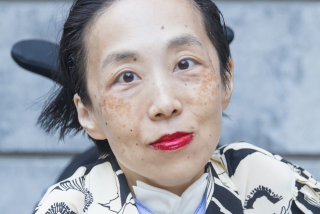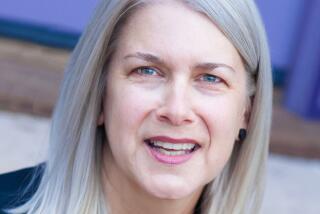BOOK REVIEW : Reflections on being an animal
Lydia Millet’s first collection of short fiction, “Love in Infant Monkeys” (Soft Skull: 178 pp., $13.95 paper), is a superb book. Featuring 10 stories -- all of which revolve in some sense around the interaction of animals and famous people -- it asks all sorts of uncomfortable questions: about ourselves, about the world around us, about the very essence of being, of belonging, of what it means to exist:
“The sun was God’s eye, she said, the oceans were the water of his body, the rivers were the veins carrying his blood. Did I know that? The grasses of the field were his hair and the trees were his lungs, the doves and the birds and the animals were wishes of his heart. Each one a piece of his longing,” Millet writes in “Tesla and Wife,” a story so beautiful it will bring tears to your eyes. “. . . Dead and alive were the same thing, she said. Dead and alive, they were exactly the same.”
Millet has long been interested in the natural; in her most recent novel, 2008’s “How the Dead Dream” -- the first in a projected trilogy about extinction -- a real estate developer breaks into zoos at night to visit the endangered animals. Here, however, her focus is a bit more narrow, although this paradoxically opens up the work.
In “Sexing the Pheasant,” Madonna shoots a bird on a hunting excursion, then ruminates on her own celebrity as she waits for it to die. “The Lady and the Dragon” portrays a Sharon Stone look-alike who finds herself in an odd kinship with the Komodo dragon that once bit the real Stone’s husband, former San Francisco Chronicle Editor Phil Bronstein, on the foot.
With these and other stories, Millet comments on our relationship to nature, the way we try so hard to stand outside it when in fact we are at its mercy every moment of our lives. “What you realize when you have a kid, if you’re a woman,” a young mother lectures Noam Chomsky in “Chomsky, Rodents,” “is we’re animals and it’s hard to be an animal. It’s hard work and danger and bile.”
She’s right, but Millet’s triumph is to dig deeper, to find the nuance in the brute. Because the more important discovery “is that it’s great to be an animal; it’s what the core of life is, to be an animal. Not to be human. I don’t mean to be human; I don’t mean that at all, Noam. I mean to be a mammal.”
-- David L. Ulin
--
More to Read
Sign up for our Book Club newsletter
Get the latest news, events and more from the Los Angeles Times Book Club, and help us get L.A. reading and talking.
You may occasionally receive promotional content from the Los Angeles Times.








